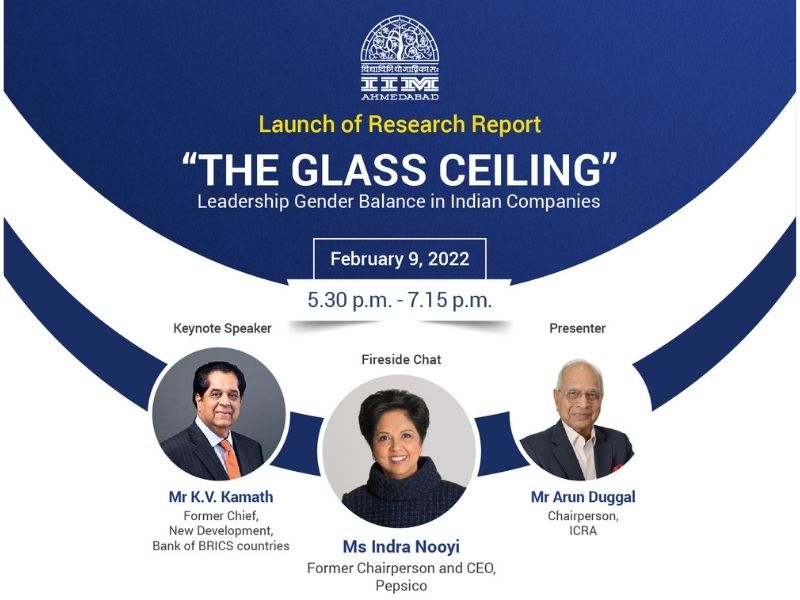The Indian Institute of Management Ahmedabad (IIMA), a premier global management Institute, hosted an event to share findings from a study titled ‘The Glass Ceiling: Research Report on Leadership Gender Balance in NSE 200 Companies’ undertaken by Professor Promila Agarwal, Associate Professor, Human Resource Management, IIMA.
The event commenced with opening remarks from Professor Errol D’Souza, Director, IIMA. Professor Promila Agarwal then presented the highlights of the study on the gender balance in NSE 200 companies in India. The event also had industry stalwarts like KV Kamath, Former Chief, New Development Bank of BRICS Countries and Indra Nooyi, Former Chairperson and Chief Executive Officer, PepsiCo who shared their views and recommendations. Arun Duggal, Chairperson ICRA presented some of the recommendations to improve this gender balance.
The study has been undertaken with two key objectives of improving gender balance amongst top management and senior executives in Indian companies as well as helping to accelerate career progression of women in senior management. Speaking on the need for the industry to take a deeper cognisance of the leadership potential of women, Professor Promila Agarwal presented the following findings from her report, which has been put together with data from across 109 NSE 200 companies and involving as many as 4146 senior executives.
- The gender pay gap widens as women advance in their careers. Every step up in responsibility increases the pay gap for women
- The percentage of women in top management and senior executive positions is significantly lower than the percentage of women on the board of directors
- On an average, women senior executives earn INR 85 for every INR 100 that men senior executives earn
- Average compensation paid to women senior executives is INR 1.91 crore and average compensation paid to men senior executives is INR 2.24 crore
- Major companies that have high women in top management roles include HUL, Kotak Mahindra Bank, HDFC Bank, ICICI Bank, L&T Infotech
- An increase in the percentage of women at the board has not yet resulted in a significant increase in the percentage of women at the top management level.
KV Kamath, Former Chief, New Development Bank of BRICS Countries said, “There are internal and external challenges and all of them come through two key things – biases and male assumptions or family stereotyping.” He added that organisations could achieve gender balance by removing existing biases around merit-based opportunities, roles that women can play in an organisation, equal pay, merit-based evaluation, etc.
In a fireside chat with students from IIMA, Indra Nooyi, Former PepsiCo CEO said it is important that companies revisit their approach towards women leaders. To ensure that women function at par with men, companies should take an ‘all talent on equal pay’ approach.
She suggested that organisations could achieve this by taking measures to put in place a critical mass of women leaders who could set the precedent and inspire other women. “Another most important thing is that men in power have to be educated. Men in society have to be educated not to discriminate against women,” she added.
Presenting his recommendations for achieving greater gender balance in workplaces, Arun Duggal said that gender balance improvement is achievable by differentiated and measurable steps. Some of the recommendations were:
- Governance measures like linking senior management performance evaluation with gender balance improvement
- Establishing clear diversity goals as part of company targets
- Detailed diversity action plans that include setting up committees, training and increasing the numbers during recruitment processes
The event was organised under the aegis of the Arun Duggal ESG Centre for Research and Innovation, which was recently launched by the Institute.
